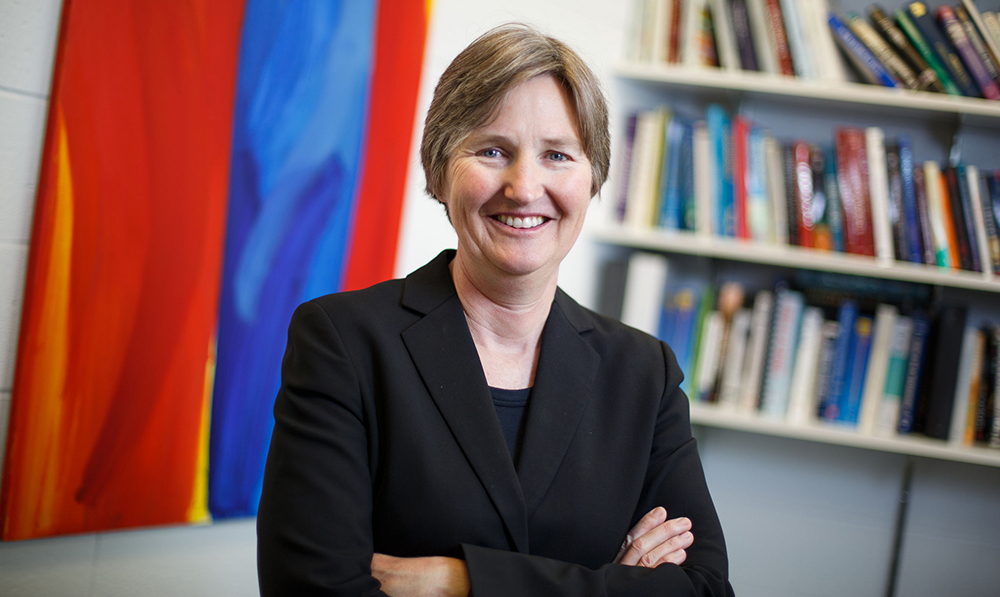
Kathryn Graddy is the new dean of Brandeis International Business School.
As the Fred and Rita Richman Distinguished Professor in Economics, Graddy has taught undergraduate and graduate students at Brandeis University for more than a decade. She is the former chair of the university’s Economics Department. At the International Business School, Graddy has served as PhD program director and senior associate dean, a position she’s held since 2016.
Graddy officially becomes dean July 1.
“I’ll tell you why I’m excited — my job is all about helping students launch successful careers,” Graddy said. “That’s always been rewarding, dating back to when I was a professor, and it’s something we do especially well at Brandeis.”
Graddy is an accomplished scholar, with expertise in the economics of art. And as the school’s first female dean, Graddy will lead a majority-female student body at a time when diversity in the workplace — and the boardroom — is a hot topic for employers everywhere.
Graddy touched on these topics and more during a recent interview.
I feel like I'm intimately acquainted with the rest of the university. I was a professor in the College of Arts and Sciences, president of Phi Beta Kappa, and I was lucky to get involved with the Gateway Scholars Program from the start. Academic rigor is inherently important to me, as is maintaining the close relationship that exists between the business school and the broader university. Brandeis IBS is stronger because of it. And in return, we provide our liberal arts students with the valuable opportunity to receive an education in business.
We are a human business school. That’s what sets us apart. We’ve always set rigorous academic standards, we’ve always had a global focus, and our professors are well-known experts in their fields. But what makes us unique is the human element. At the end of the day, our doors are open. Our classes are small and our faculty go out of their way to make lasting connections with students. This is something I’m always hearing about from our alumni. They’re so proud of their career achievements and so appreciative of the professors who helped them get there.
We can always learn new things about the arts and culture when we view them through an economic lens. One of my recent research projects focused on creativity. We examined sale prices and museum placements for works of art that were created immediately following the death of an artist’s loved one or close friend. So, what happens to the creative process during this bereavement period? It turns out these pieces sell for approximately 30 percent less than other works. And they're less likely to be included in museums. All of this may run contrary to the popular idea of an artist reaching new creative heights after experiencing loss. But we used data and techniques developed in economics and business. And the results were quite revealing.
They should hire them. And they should promote them. Personally, I didn’t grow up thinking of CEOs as being male or female. The same is true as dean — I don’t think of myself as the new female dean. I’m simply the new dean of the International Business School. But I do think it’s true, unfortunately, that people tend to hire other people that look like them. And yet studies show that diverse teams often perform better. So it really is important for employers to take diversity seriously. And not just gender diversity, but in every aspect. It’s beneficial to society when individuals from all backgrounds are given the chance to succeed. And it’s good for business too.
I see the International Business School as the business school of the 21st century. This is an innovation economy and we’re going to continue providing the cutting-edge training — and the connection to businesses — that our students need to succeed in their careers. We’re already strong in business analytics and finance, which is where we’re seeing lots of new opportunities around fintech. And we have the programs to launch students into business as well — startup competitions, access to incubators and courses in venture capital and private equity. So what’s next? One of our strengths at Brandeis IBS is our nimbleness and creativity. As innovation continues to reshape our economy, we’ll be out in front, preparing our students to be global business leaders.
Featured Stories
News Categories
@BrandeisBusiness Instagram
View this profile on InstagramBrandeis Intl. Business School (@brandeisbusiness) • Instagram photos and videos